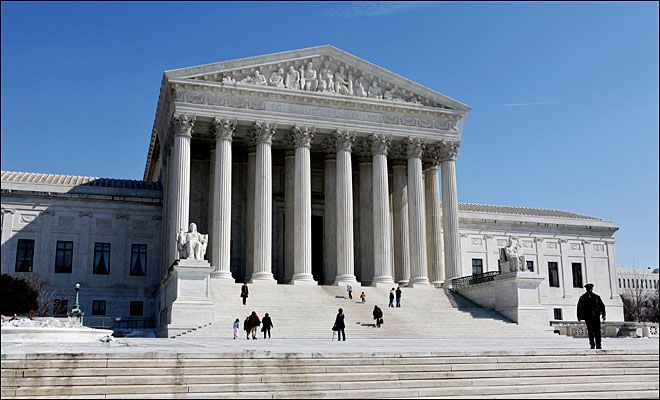The Supreme Court of the United States (SCOTUS), snuck around in the early morning hours Saturday to decree that stopping a Texas law which discriminates on racial grounds would be unfair to Republicans in Texas who have worked so hard to disenfranchise those who might vote against them.
Justice Ruth Bader Ginsburg wrote (another) scathing dissent which was also signed by Justices Sotomayor and Kagan.

Sadly, three votes to protect the right to vote is as meaningful as zero votes on a court intent upon disenfranchising those who would vote against their preferred political party. It is not enough to be right, we need to win these, especially the obvious ones.
Justice Ginsburg harkens back to the mindnumbing disconnect from reality present in the majority’s Shelby v Holder ruling last year that struck preclearance from the Voting Rights Act. Chief Justice Roberts declared that we are now post-racial and there is no need to consider history, blahblah, pesky facts, blahblah. But, as Justice Ginsburg notes in her dissent “racial discrimination in elections in Texas is no mere historical artifact. To the contrary, Texas has been found in violation of the Voting Rights Act in every redistricting cycle from and after 1970.”
An estimated 600,000 citizens in Texas have not paid the 2014 version of the poll tax and will not have the required ids needed to vote this year.
THAT is how Republicans win: by denying the right to vote to those who are likely to vote against them. They can’t win on their ideas and this is the last desperate gasp of a party soon to become a minoritea. That moment will likely be delayed unless we can convince two more justices that the right to vote is a fundamental right under our constitution and that artificial barriers to voting should be stricken.
Really, how can they let this stand? Justice Ginsburg:
The greatest threat to public confidence in elections in this case is the prospect of enforcing a purposefully discriminatory law, one that likely imposes an unconstitutional poll tax and risks denying the right to vote to hundreds of thousands of eligible voters.
Stop hurting America, SCOTUS. Give us back our democracy.
democracy [dih-mok-ruh-see]
noun
1. government by the people; a form of government in which the supreme power is vested in the people and exercised directly by them or by their elected agents under a free electoral system.


